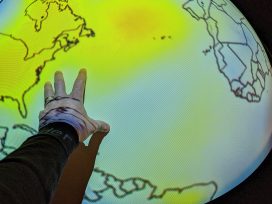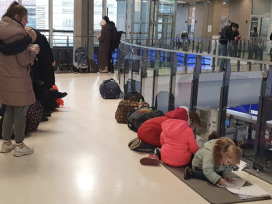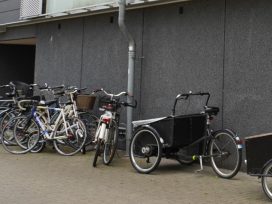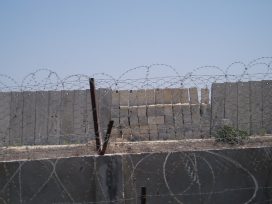The alleyways of old Kraków teemed with teenage pilgrims. The locals go about their daily lives tempering their irritation. This is World Youth Day 2016 after all, and a good Pole should not be riled by wholesome holiness, especially not when Pope Francis is in town. Returning home one evening from Krakow’s central railway station, I run into a small group of pilgrims from Iraq. They had lost the crowd, hence the sense of illicit relief. One of them held an Assyrian flag and they were pleased that I had recognised it. But then again, “everybody knows about us here!” they beamed. “Everybody knows about the Assyrians!”
Amid the carnage in Iraq and Syria, it is common to read what are essentially obituaries for Christian life in the region. Up to 70 per cent of Iraq’s Christians may have fled the country since the US-led invasion of 2002, with nearly half fleeing neighbouring Syria since 2010. These ancient communities were once several million strong, including related Aramaic-speaking groups such as the Assyrians and Chaldeans.
Iraq’s Christians inhabited, or are attempting to inhabit, some of the most heavily contested areas such as the Nineveh Plains outside Mosul. ISIS conquered the northern city in June 2014, forcing 100,000 Christians from the surrounding area to flee into the relative safety of the neighbouring Kurdistan Autonomous Region. That September the terrorist group demolished Dair Mar Elia outside Mosul. Built in the sixth century it was the oldest Christian monastery in Iraq. Christians, Yazidis and other minorities are subject to a concerted campaign of genocide at the hands of ISIS. With their homes convulsed by war, Iraqi and Syrian Christians have joined the odyssey to Europe — en masse and on foot.
Diminishing hospitality
Europe has a crisis of borders. The collapse of the Berlin wall heralded a new European unity solidified by the Schengen Treaty in 1995. As internal boundaries within the EU faded away, its outer barriers became harder to breach. Last year alone over one million undocumented refugees and migrants entered the EU from the east and south. According to the International Organisation for Migration, since 2004 more than 23,700 migrants have died attempting to enter the EU. The casualties have since mounted. With right-wing populism and xenophobia are on the rise across the continent, and the political impulse to sort new arrivals into the “worthy” and “unworthy” has become even stronger.
Discrimination on the basis of religion is specifically prohibited under European law. Nevertheless, some government representatives – from Estonia to Slovakia – have hinted that they will accept Christian refugees only. European hospitality, such as it was, has run dry. And that is largely articulated through Islamophobia, or the securitisation of Muslim refugees. Recent polling data from the Pew Research Center reveal that a majority of citizens in ten EU countries perceive refugees from Iraq and Syria as a security threat. This distrust was higher among those with a negative view of Muslims. Hungary and Poland were the countries that topped the list.
Unsurprisingly, Brussels’ September 2015 plan for a quota agreement on refugee resettlement across the EU was met with resistance in Central Europe. This would have seen 120,000 refugees (a token figure, given the overall numbers) resettled across the Union, with a proportional distribution across member states. The region has little experience of immigration from Muslim-majority countries compared to former colonising countries (or Gastarbeiter destinations) to the west. For populist leaders in the Visegrad states, it is a perfect bone to pick with Brussels.
Viktor Orbán brought the resettlement of slightly over 1,200 refugees to a controversial referendum. The Hungarian prime minister’s approval rating had seen a steady growth over the past year as his Fidesz government took a hardline stance against refugees entering the country from the Balkans. Meanwhile, 72 per cent of Hungarians hold an unfavourable view of Muslims living among them – an impression doubtlessly aided by state media campaigns, which push xenophobic narratives and news about terrorist attacks in Brussels, Nice and Paris.
Hungary’s neighbours in Slovakia took it one step further, declaring in August 2015 that it would reject plans to resettle 800 refugees. In any case, this predominantly Catholic country of 5.5 million inhabitants declared they would only accept Christians. In the words of government spokesman Ivan Netik, the move was designed to “further community cohesion”. Officials claimed that life would be tough for Muslim refugees in Slovakia, given the country’s lack of mosques (nevertheless, freelance journalists promptly found one in the heart of Bratislava). Prime Minister Robert Fico boasted that “each and every Muslim” in the country would be monitored by the security services and that Islam “has no place” in Slovak society.
On the airwaves and in print, Central Europeans’ rejection of refugees is often framed as a clash of cultures, civilisations and faiths. Yet there are more immediate justifications at play. As fortunes turn sour, Europeans (in the east and west) blame migrants for pushing down wages and putting their already precarious jobs on the line. Despite much evidence to the contrary, this has become commonly accepted across Europe. Brussels has become the bête noire for Europe’s populist leaders. But behind their belligerence lies an uncomfortable truth: to a larger degree than in Western Europe, social stability in the Visegrád states depends on freedom of movement for citizens abroad. As the destinations from any regional airport in Poland or Slovakia make clear, jobs are to be found in Britain, France, Germany and the Netherlands. Ironically, Hungary now faces a severe labour shortage, with employers unable to fill as many as 50,000 private-sector jobs.
The Hungarian academic G.M. Tamás writes of “competitive immigration” among central and eastern Europeans, bringing with it the fear that western-bound (and often educated) Middle Eastern refugees will threaten the livelihood of young Hungarians, Poles or Slovaks. It’s a touchy subject. In a meeting earlier this year with David Cameron, Orbán called on Britain not to treat Hungarians working in the UK as mere “migrants”. They are, he implied, fellow Europeans and therefore a worthier class of alien.
Nitra: No foreign land
With these economic realities in mind, how long-lasting will the sympathy for Christian suffering last, particularly when “they” move in down the street? Nitra is a small city of around 78,000 people in western Slovakia, nestled at the foot of a castle-crowned hill. A walk down the main drag, Štefánikova Street, paints a picture seen across the provincial former Habsburgia: there’s brand new infrastructure (thanks to the EU), shiny new buses (also thanks to the EU) and no jobs (they are elsewhere in the EU).
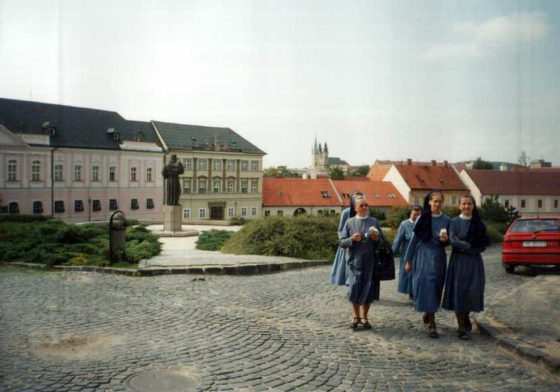 Nitra, Slovakia, 26 October 2005. Photo: Wojsyl. Source: Wikipedia
Nitra, Slovakia, 26 October 2005. Photo: Wojsyl. Source: Wikipedia
Since December 2015 a small group of Christians from Iraq have called this small town their home away from home. I climbed up to the cobblestone side streets beneath Nitra’s castle. A makeshift community centre has been set up in one of these historic monastic buildings under the auspices of the Archbishopric of Nitra and a local charity founded in June 2015, Pokoj a Dobro.
There are a few people about on his hot September afternoon. A few kids mill around in the courtyard, their ball and their words, some Arabic, some Neo-Aramaic, bounce off the stone walls. The new arrivals have been settled in apartments across Nitra; this building hosts community events and the offices of Pokoj a Dobro.
“In an ideal world, we wouldn’t have any work. What’s happening is such a tragedy,” sighed Dr Peter Brenkus, and one of the charity’s founders and directors. Brenkus and his colleagues aim to offer long-term institutional and legal support to refugees rather than humanitarian aid at the EU’s borders. As a priest himself, he developed a keen interest in the persecuted Christian communities in Syria and Iraq. With that in mind, Pokoj a Dobro, along with the fellow charity Kto Pomôže has co-ordinated the relocation of 149 Iraqi Christians in December 2015. These refugees, mostly families, were selected from among 1,000 applicants in refugee camps outside Erbil in Iraq’s Kurdistan Region. Like many Iraqi Christians, they are all speakers of Neo-Aramaic (and somewhat erroneously reported as speakers of “the language of Christ”).
How the first of these refugees arrived in Slovakia could merit its own article (after all, a documentary has already been produced). On December 10th 2015 a chartered plane touched down in Košice airport in eastern Slovakia carrying 25 Christian families bound for the nearby asylum facility at Humenné. Among the largest sponsors for the relocation was none other than Glenn Beck’s Nazarene Fund (Glenn Beck is a conservative American radio and television commentator – editor’s note). The refugees’ spiritual leader Father Douglas Al-Bazi thanked Slovakia’s government during a press conference with the international media. In the weeks prior, some 560 Christian refugees from the Iraqi town of Qaraqosh had slept under the roof of his Chaldean Catholic church in Erbil.
Al-Bazi concluded his thanks with a text from the Mishnah, in reference to a very important colleague. Aron Shaviv is an Israeli PR strategist, widely known for his role in the recent re-election of Israel’s Benjamin Netanyahu. After a plea for help from Al-Bazi reached the US-based Hudson Institute, Shaviv and his Slovak associate Michal Repa negotiated with potential host countries for Christian refugees. The heroes of the story, as Shaviv put it in interviews, were Joseph and Michele Assad, two ex-CIA agents of Coptic Christian origin who facilitated the relocation of the selected Christian families from Erbil.
Shelter
Since their arrival, the refugees’ lives in Nitra have not been plain sailing. There are few jobs here for the locals, let alone the newcomers. Brenkus tells me that, as of December 2016, 87 of the initial 149 Christian refugees remain in Nitra (along with three newly-born children). In some cases, relatives made it to Germany or Sweden and some of the refugees left Slovakia to join them.
Brenkus admits that some of the refugees have faced verbal abuse from locals, who either “thought they were Muslim”, or “objected to any foreigners living here”. He and his colleagues had initially planned to settle the refugees in smaller towns throughout the region. Once reports came in of threats made against hosts for the Iraqi families, that plan was swiftly abandoned, but not before it was raised on a prime time panel discussion show in December, where Fico stressed that a solution must be found to both aid Assyrian Christians without “antagonising the Slovak public”. The state, he concluded, must replace volunteers in finding suitable accommodation.
The rescue and resettlement effort was not initiated by the Slovak government. But the refugees arrived at a politically opportune time – just days after Bratislava filed a legal challenge to the EU’s quota system for the refugee resettlement, which 89 per cent of Slovaks opposed.
Downstairs in the community common room, I meet Michel Yusuf Edouard and his friend Bassem, a refugee from Qaraqosh. This silver-haired bible teacher works as the community’s co-ordinator. Edouard is three times a refugee. As a Christian during the first Gulf War, some neighbours and army officers considered him a potential traitor. He fled to Jordan, where he stayed until the fall of Saddam Hussein in 2003. A few years after his return to Baghdad, he received anonymous death and kidnapping threats against his family and so they fled to Iraqi Kurdistan via Mosul in 2006. There, he taught the bible again thanks to Bashar Warda, the Chaldean Catholic Bishop of Erbil. In August 2014, thousands of Christians fled ISIS into Iraqi Kurdistan – Bassem was among them. As they reached Erbil, Edouard started relief work, meeting Douglas Al-Bazi. This was the start of his journey to Slovakia.
Like other refugees I speak to here in Nitra, he’s grateful if cautiously optimistic. “This country is a shelter for us, where we’ve at least found peace. But many of these families are traumatised,” begins Michel. “Slovakia is a European country, but it’s not a European country like France, Britain or Germany. Some of the first refugees who arrived here couldn’t deal with the difference in language, culture or lack of jobs. About five families even returned to Iraq.”
Michel was once offered a trip to Sweden by his relatives in Jönköping, where there is a significant Assyrian and Chaldean community. He turned it down, citing the importance of his work in Nitra. There’s still a lot to be done. And a lot of it must be done in Slovak – a language the refugees have found difficult to master. Alongside Slovak, Edouard and Pokoj a Dobro plan language tuition in Arabic, Neo-Aramaic and English.
Despite their poor language skills, some refugees have found work as carpenters in a nearby furniture factory or as cooks in a local restaurant. Another project on the horizon is an Iraqi restaurant in Nitra, in order to build better bridges with their Slovak neighbours. Edouard’s demeanour indicates he has had plenty of experience with the media. In fact, many of these refugees have, and not all for the better. They are a little fed up of journalists; I’m hardly the only one here today.
The local media coverage of their community was once good-natured, note Bassem and Michel, but it since took a turn for the worse. “The media is a weapon. It’s like a knife, you can use it to make a salad, or to murder someone,” laughs Michel. As a result, some Slovaks are pretty negative towards us.
“In any case, Slovakia is my home now,” concludes Michel. “When I went knocking, Slovakia was the only place which opened the door. Why should I turn away now?”
As I leave the common room, I notice a Slovak-language workbook and notes strewn on a sofa. Somebody’s written a few choice words and their Arabic translations, but the lessons have clearly just begun. There are a lot of blank pages left in this story.
Sympathy of a sort
Lamentably, solidarity with the Middle East’s beleaguered Christians carries its own ideological baggage. Excluding Christian-interest organisations and publications, their plight has become a central talking point in nativist, xenophobic discourse – from Breitbart to the Daily Express. This is not a reason to dismiss the sorely needed attempts to help Christians, but it is a reason to reject the argument that they are the only ones with a legitimate claim to protection. LGBT people in Iraq or Syria are one other example, Yezidis, Shia and progressive Sunnis in northern Iraq are another, while the bar ISIS sets for “progressive” under ISIS lowers by the month.
European politicians do not want to be seen as soft on (Islamist) terrorism. Their receptiveness to Christians – and only Christians – can function as a fig leaf for refusing the overwhelming majority of those in need – a majority of whom happen to be Muslim. There are similar stories across the Visegrad states. The Czech Republic, whose president Miloš Zeman declared refugee movements into Europe to be an “organised invasion”, refused to accept the 1,591 refugees allocated under the EU quota agreement. A plan by the Generation 21 NGO to relocate 153 Iraqi Christians was temporarily suspended by Prague in April, after a small group of the new arrivals attempted to leave for Germany, disenchanted with their prospects in the Czech Republic. Warsaw has not been quite as explicit as Slovakia. Poland instead dragged its feet over the quota agreement, attempting to negotiate for a smaller number of refugees. One NGO, the Fundajca Estera, encouraged the Polish government to accept around 1,500 Middle Eastern Christian refugees. Nonetheless, by January 2016, the overwhelming majority of the 160 Syrian Christians given asylum under its auspices in 2015 had left Poland, most probably for Germany.
Strictly speaking, to name such responses a “Christians-only policy” could be tendentious. Indeed, according to the head of the IOM’s Slovakia Office Zuzana Vatralova, such a policy would be impossible under Slovak law. Yet the rejection of refugees under the EU’s quota programme, and eager support for the private initiatives of Christian charities, does not make the perception unjustified. The result, after all, may well be the same. The Christian world is enormously diverse; the culture and customs of Arabic and Aramaic-speaking Chaldean Christians do not automatically engender a smooth transition into a Roman Catholic, post-communist, Eastern European society.
“According to our experience”, concludes Vatralova, “it is obvious that secure income and housing make integration smoother … religion as such does not make a significant difference in a person’s ability to do so.”
“Yes, the culture is very different,” responds Brenkus, when I put this to him. “But on some deep level, they share the same Christian values. Only a very small minority of Muslims commit terrorist acts, but it happens. And it doesn’t happen among Christian refugees. Besides”, the priest concludes, “integration is not a one-way street. It depends on how local people react. You can behave however you want, but if the local people do not accept you, you will live in a ghetto.”
Whatever the baggage of advocacy for the Middle East’s Christians, it makes little difference to those like Bassem and Michel, who have reached Nitra and now live in safety. But a longer-term European plan for action must create space for solidarity with those most desperate, regardless of their faith.
